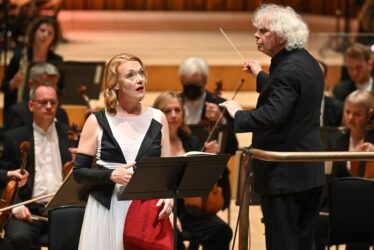 United Kingdom Weill: Soloists, London Symphony Orchestra / Sir Simon Rattle (conductor). Barbican Hall, London, 27.4.2022. (CC)
United Kingdom Weill: Soloists, London Symphony Orchestra / Sir Simon Rattle (conductor). Barbican Hall, London, 27.4.2022. (CC)

Weill – Street Scene (1946): ‘Lonely House’ (with Andrew Staples)
The Seven Deadly Sins (1933)
(Casting consultant: Sarah Playfair)
Magdalena Kožená – Anna
Andrew Staples – Father
Alessandro Fisher, Ross Ramgobin -Brothers
Florian Boesch – Mother
Quite the Half Six Fix this: Weill’s music remains under-appreciated (his 1921 Violin Concerto is a gem). Even Aufstieg und Fall der Stadt Mahagonny and the ‘ballet chanté in one act’ The Seven Deadly Sins (Die sieben Todsünden) do not get full due, so it was lovely to hear this short concert ahead of the fuller concert the following evening, which added the Little Threepenny Music, Death in the Forest and two of the group of four Walt Whitman Songs.
Sir Simon Rattle opted to programme the ‘encore’ as the first piece, which therefore did not appear on the printed flyer-plus-QR code: Andrew Staples singing the wonderful ‘Lonely House’ from Street Scene – a piece without which, Rattle claimed, West Side Story could not have happened. There is an unmissable link via the collective unconscious between the string opening of ‘Lonely House’ and the James Bond movies; interesting, as Lotte Lenya (1898-1991), Weill’s wife and muse, appeared as the character Rosa Klebb in From Russia with Love. Weill’s song itself is beautifully done, those characteristic twists of harmony (‘sometimes I hear a neighbour snoring’ – on the word ‘snoring’) creating an unmistakable atmosphere. Staples’s rendition was beautiful, blanched of tone, brilliantly conveying the sense of isolationism in a city.
The main course though was Die sieben Todsünden (The Seven Deadly Sins). There’s a lot of them about – one only need think of Beauty and the 7 Beasts at Brixton Jamm recently (review here). Magdalena Kožená, clad in a dress that had a red addition on one side to indicate her dual personality (‘the two Annas’), excelled in the main role, in fine voice, free and expressive, with her wide range put to good use to differentiate the Anna and her more parlando doppelgänger (the role of the second Anna is accorded to a dancer in a staged production). Kožená’s performance of the final sin, ‘Neid’ (Envy) was particularly impressive, with a core of steel that represented her at her very best.
In this performance, Anna was alone on one side of the stage, with the other singers on the other side of the conductor, which worked brilliantly as the male characters (the Mother is a bass, remember) often act as a ‘Greek chorus’ single unit in the shape of a barbershop quartet. The orchestral positioning seemed significant in relation to this too with the brass more segregated from the rest of the band, and closer to the group of vocal soloists.
The group of male singers did indeed work brilliantly as an entity, with bass-baritone Florian Boesch in particularly fine fettle. But hearing them, alone, in the opening of ‘Völlerei’ (Gluttony) was a treat indeed. Nice to see Ross Ramgobin among the line-up as one of the brothers – he previously impressed massively as Figaro at Opera Holland Park and in his ENO debut this season as Prince Arjuna in Philip Glass’s Satyagraha, and this is surely another step in his ascent. Good to be introduced, too, to tenor Alessandro Fisher as the other Brother, a name I am sure we will encounter again.
Rattle’s orchestra captured the feel of each movement/sin perfectly, nowhere more so than in the lilting, dark waltz of ‘Stolz’ (Pride, set in Memphis – the plot concerns Anna’s successful attempts to find the funds to build a home for the family over seven years) while they were consistently on the ball throughout (‘Zorn’ – Wrath, set in Los Angeles – poses particular challenges, with the LSO triumphing over them all). The bite of Bertolt Brecht’s satire seemed as present in Weill’s music as it was in the words.
Lenya’s is the most famous recording of the Sins, but one must not forget Brigitte Fassbaender, Anne Sofie von Otter and Anja Silja are amongst the roster of artists who have tackled the piece successfully. The presence of microphones (and cameras) bodes well for a release of this performance (or the one on 28 April), allowing Kožená to join their exalted ranks.
Colin Clarke
